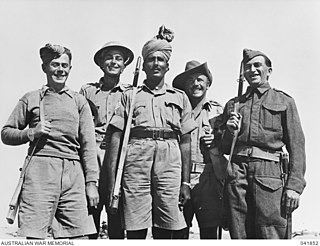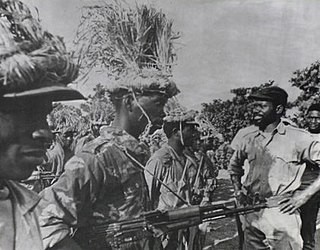
The Organisation armée secrète was a far-right dissident French paramilitary and terrorist organisation during the Algerian War, founded in 1961 by Raoul Salan, Pierre Lagaillarde and Jean-Jacques Susini. The OAS carried out several terrorist attacks, including tortures, bombings and assassinations, all resulting in over 2,000 deaths in an attempt to prevent Algeria's independence from French colonial rule. Its motto was L’Algérie est française et le restera.

The siege of Tobruk took place between 10 April and 27 November 1941, during the Western Desert campaign (1940–1943) of the Second World War. An Allied force, consisting mostly of the 9th Australian Division, commanded by Lieutenant-General Leslie Morshead, was besieged in the North African port of Tobruk by German and Italian forces. The tenacious defenders quickly became known as the Rats of Tobruk. After 231 days, they were finally relieved by the British Eighth Army.

The Angolan War of Independence, known as the Armed Struggle of National Liberation in Angola, was a war of independence fought between the Angolan nationalist forces of the MPLA, UNITA and FNLA, and Portugal. It began as an uprising by Angolans against the Portuguese imposition of forced cultivation of only cotton as a commodity crop. As the resistance spread against colonial authorities, multiple factions developed that struggled for control of Portugal's overseas province of Angola. There were three nationalist movements and also a separatist movement.

The Guinea-Bissau War of Independence, also known as the Bissau-Guinean War of Independence, was an armed independence conflict that took place in Portuguese Guinea from 1963 to 1974. It was fought between Portugal and the African Party for the Independence of Guinea and Cape Verde, an armed independence movement backed by Cuba, the Soviet Union, Yugoslavia and Brazil. The war is commonly referred to as "Portugal's Vietnam" because it was a protracted guerrilla war which had extremely high costs in men and material and which created significant internal political turmoil in Portugal.

The Portuguese Colonial War, also known in Portugal as the Overseas War or in the former colonies as the War of Liberation, and also known as the Angolan, Guinea-Bissau and Mozambican War of Independence, was a 13-year-long conflict fought between Portugal's military and the emerging nationalist movements in Portugal's African colonies between 1961 and 1974. The Portuguese regime at the time, the Estado Novo, was overthrown by a military coup in 1974, and the change in government brought the conflict to an end. The war was a decisive ideological struggle in Lusophone Africa, surrounding nations, and mainland Portugal.

The 1st Battalion, Rhodesian Light Infantry (1RLI), commonly The Rhodesian Light Infantry (RLI), was a regiment formed in 1961 at Brady Barracks as a light infantry unit within the army of the Federation of Rhodesia and Nyasaland. Barely a year after its creation, it was relocated to Cranborne Barracks (Salisbury) where its headquarters remained for the rest of its existence. The Regiment became part of the Southern Rhodesian Army when the Federation dissolved at the start of 1964 and, later that year, reformed into a commando battalion.

Operation Rimau was an attack on Japanese shipping in Singapore Harbour, carried out by an Allied commando unit Z Special Unit, during World War II using Australian built Hoehn military MKIII folboats. It was a follow-up to the successful Operation Jaywick which had taken place in September 1943, and was again led by Lieutenant Colonel Ivan Lyon of the Gordon Highlanders, an infantry regiment of the British Army.

The Commandos are a commando unit in the Portuguese Army. Presently, their parent unit is the Commando Regiment.

Bien Hoa Air Base is a Vietnam People's Air Force (VPAF) military airfield located in South-Central southern Vietnam about 25 km from Ho Chi Minh City, across the Dong Nai river in the northern ward of Tân Phong, and within the city of Biên Hòa within Đồng Nai Province. The boomburb city is densely populated and rings the base, despite significant levels of Agent Orange toxins simply left there for decades. Cleanup and remediation began in 2019.

Tan Son Nhut Air Base (1955–1975) was a Republic of Vietnam Air Force (RVNAF) facility. It was located near the city of Saigon in southern Vietnam. The United States used it as a major base during the Vietnam War (1959–1975), stationing Army, Air Force, Navy, and Marine units there. Following the Fall of Saigon, it was taken over as a Vietnam People's Air Force (VPAF) facility and remains in use today.

The Mozambican War of Independence was an armed conflict between the guerrilla forces of the Mozambique Liberation Front (FRELIMO) and Portugal. The war officially started on 25 September 1964, and ended with a ceasefire on 8 September 1974, resulting in a negotiated independence in 1975.

The 1st Special Operations Wing at Hurlburt Field, Florida is one of three United States Air Force active duty Special Operations wings and falls under the Air Force Special Operations Command (AFSOC).

The Battle of Labuan was an engagement fought between Allied and Imperial Japanese forces on the island of Labuan off Borneo during June 1945. It formed part of the Australian invasion of North Borneo, and was initiated by the Allied forces as part of a plan to capture the Brunei Bay area and develop it into a base to support future offensives.
Eelam War III is the name given to the third phase of armed conflict between the Sri Lankan military and the separatist Liberation Tigers of Tamil Eelam (LTTE).

The military history of Zimbabwe chronicles a vast time period and complex events from the dawn of history until the present time. It covers invasions of native peoples of Africa, encroachment by Europeans, and civil conflict.

The attack on USNS Card was a Viet Cong (VC) operation during the Vietnam War. It took place in the port of Saigon in the early hours of 2 May 1964, and was mounted by commandos from the 65th Special Operations Group.

The 1st Battalion, The Rhodesian Light Infantry, commonly the Rhodesian Light Infantry, was originally formed in 1961 as a regiment of the army of the Federation of Rhodesia and Nyasaland. Raised as a light infantry unit at Brady Barracks, Bulawayo in Southern Rhodesia, the Regiment served in the Rhodesian Bush War as part of the Rhodesian Security Forces between 1964 and 1979, from 1965 under the unrecognised governments of Rhodesia and latterly, during the second half of 1979, Zimbabwe Rhodesia. The RLI remained active during an interim period under British control and then, from April 1980, within the armed forces of Zimbabwe, before disbanding on 31 October 1980.

The 1st Battalion, The Rhodesian Light Infantry, commonly the Rhodesian Light Infantry, served in the Rhodesian Bush War as part of the Rhodesian Security Forces between 1964 and 1979, under the unrecognised government of Rhodesia following its 1965 Unilateral Declaration of Independence from Britain. During the second half of 1979 it fought for Zimbabwe Rhodesia, a black majority-ruled version of the same state which also failed to win international recognition. After an interim period under British control from December 1979 to April 1980, the RLI briefly remained active within the armed forces of Zimbabwe, but did not see action under this government. It disbanded on 31 October 1980.

Operation Barkhane was a counterinsurgency operation that started on 1 August 2014 and formally ended on 9 November 2022. It was led by the French military against Islamist groups in Africa's Sahel region and consisted of a roughly 3,000-strong French force, which was permanently headquartered in N'Djamena, the capital of Chad. The operation was led in co-operation with five countries, all of which are former French colonies that span the Sahel: Burkina Faso, Chad, Mali, Mauritania and Niger. Mali was a part of the operation until August 2022. The countries are collectively referred to as the "G5 Sahel". The operation was named after a crescent-shaped dune type that is common in the Sahara desert.
Events in the year 2017 in Afghanistan.

















